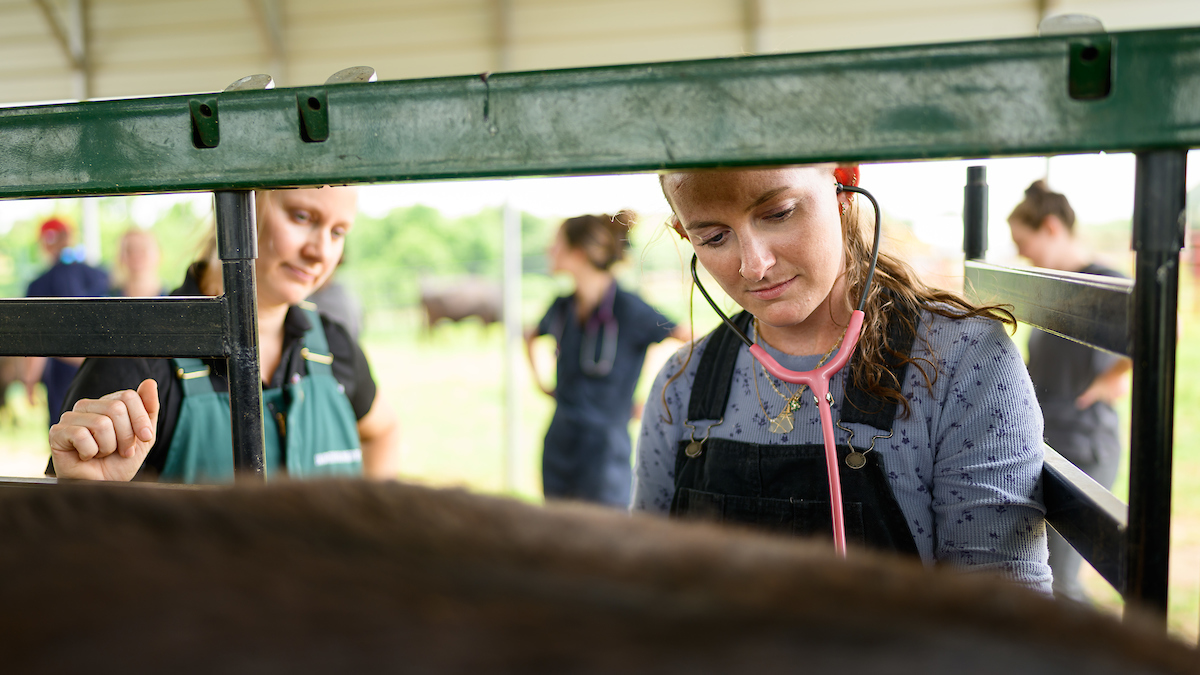CVM Leads National Trial Involving Acute Disc Herniations in Canines
The College of Veterinary Medicine (CVM) is the lead investigator in a national trial evaluating the effectiveness of medical therapies combined with surgical treatment of severe acute disc herniations in dogs.
A common problem in chondrodystrophoid breeds such as Dachshunds, Bassett Hounds, Pekinese, Beagles, and Lhasa Apsos, acute intervertebral disc herniations (IVDD) occur when the disc material located between spinal vertebrae degenerates and herniates into the spinal canal, causing both contusive injury and compression of the spinal cord. Symptoms range from a loss of coordination and back pain to complete paralysis of the hind end.
Disc herniations are the most common cause of canine paralysis and 50% of dogs suffering severe spinal cord injury that causes loss of sensation and paralysis to the hind legs remain permanently paralyzed and incontinent despite state-of-the-art treatment.
“Current IVDD treatment calls for surgical decompression of the spinal cord followed by rehabilitation to help the dog recovery full mobility,” says Dr. Natasha Olby, CVM associate professor of neurology and principle investigator for the study. “There is controversy, however, about whether adjunctive medical therapy could improve outcome, and this trial will compare the effect of two different drugs with a placebo on outcome of surgically treated dogs.”
According to Dr. Olby, the medications being investigated for use as adjuncts to surgery are methylprednisolone sodium succinate (MPSS) and polyethylene glycol (PEG). MPSS has demonstrated small benefits in human clinical trials, but these trials are controversial and many clinicians question their results. Moreover, MPSS can cause side effects such as gastrointestinal hemorrhage and increased incidence of infections. Limited experience with PEG suggests the drug is safe and while a preliminary trial in dogs suggested that it was beneficial it has not been evaluated in a blinded, prospective study so its efficacy is unclear at this time.
“This clinical trial will compare the use of MPSS, PEG, and saline placebo as adjunctive treatment to surgical decompression of the spinal cord,” says Dr. Olby. “The data generated will represent the first objective information on the medical management of acute disc herniations in paraplegic dogs. We hope to resolve the controversies surrounding the medical treatment of this common disease and to improve the outcome of the group of patients that currently remain paralyzed.”
Funded by the Morris Animal Health Foundation, the study involves 12 veterinary neurology centers from throughout the U.S. that are involved in recruiting 180 dogs to receive one of the three possible therapies (MPSS, PEG, or placebo). To be considered as a participant, patients must have recent onset of the most severe grade of injury—paralysis with no sensation in the hind limbs of no more than 24 hours duration.
Please see www.cvm.ncsu.edu/vhc/tc/clinical_services/neuro/acute_disc.html for more information on the clinical trial, selection criteria, benefits to patients and their owners, and to find contact information for the investigators.
[section_subtitle]Participating medical centers include: [/section_subtitle]
- North Carolina State University College of Veterinary Medicine;
- University of Georgia College of Veterinary Medicine;
- University of Tennessee College of Veterinary Medicine;
- University of Pennsylvania School of Veterinary Medicine;
- University of Missouri-Columbia College of Veterinary Medicine;
- Iowa State University College of Veterinary Medicine;
- Carolina Veterinary Specialists Medical Center of Charlotte, NC;
- Veterinary Specialty Hospital, San Diego, CA.;
- Northwest Veterinary Specialists, Clackamas, OR;
- Gulf Coast Veterinary Specialists, Houston, TX;
- Dogs and Cats Veterinary Referral, Bowie, MD;
- Animal Specialty Clinic, Yonkers, NY.;
- Bush Veterinary Neurology Services, Leesburg, VA.


